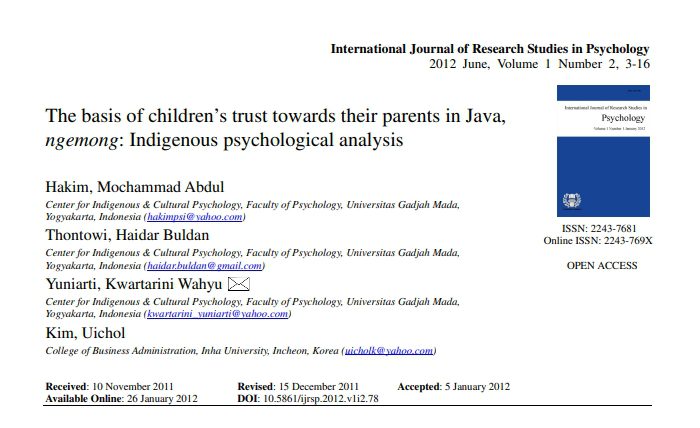
ABSTRACT. The word among is used to describe the parent-child relationship in Javanese cultural context. Javanese is one of ethnic groups in Indonesia. According to Dewantara (1968), among consists of three nurturing components: providing affection (asih), stimulating potentials of the child (asah), and fulfilling the needs of the child (asuh). The purpose of this study was to examine the relationship between the concept of among and the development of trust towards parents. This study examines the reasons why Javanese trust their mothers and fathers. A total number of 356 Javanese students (males = 97, females = 259) at Universitas Gadjah Mada completed open-ended questionnaires, asking how much they trust their parents, and the reasons why they trust their parents. The data was analyzed using indigenous psychological approach. Preliminary coding, categorization, axial coding and cross-tabulations were run accordingly. Results show as the following: first, the students tend to trust their mothers more than their fathers. Second, trust to mothers was more on the direction of emotional bonds, whereas trust to fathers was more related to the cultural expectations. The three components of among (asih, asah, and asuh) were also found in the results of the study and appeared to be frequently stated in the responses. The study concluded that Javanese children’s trust to mother tends to base on affectional (asih) and caring (asuh) aspects, while their trust to fathers laid on teaching and modeling (asuh) aspects. Many psychologists believe that the characteristics of children’s general trust which is growing in the family context become the basis of social relation in the social interaction. It is good to know that, so parents will also have to learn the expection of their children to facilitate them growing, and eventually leading to their fruitful accomplishments of the children. Parental education in forming the basic trust for facilitating the children’s growth in the local context is something we might need to develop and construct in the future. In the long future these will contribute, to the reduction of any conflicts and social friction, which (was suspected) originated from the lack of trust between social groups. A strong foundation of trust is eventually strenthening the establishment of harmonious society under the frame of Unity in Diversity (Bhinneka Tunggal Ika), the basis of Indonesian nationalism.
